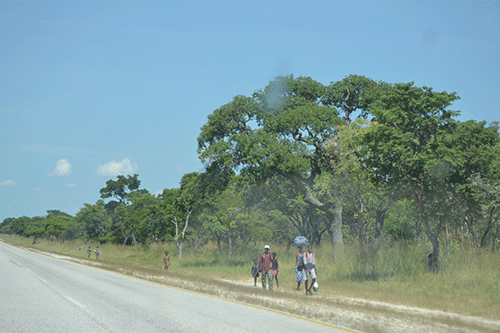Although the government has structures in place to raise awareness, provide education and give a voice to vulnerable communities, the San-speaking community living in the Bwabwata National Park feels forgotten on many social, educational, and economic benefits.
These are the sentiments of the Khwe (San) community members who have lived in the park since time immemorial.
Through their community youth activist, Kaseta Khumalo, the group laid out several concerns, including poverty, joblessness among the youth, non-recognition by traditional authorities and favouritism when it comes to marginalised programmes, among other challenges.
“Non-marginalised people are benefiting from marginalised people’s benefits. They are studying through scholarships from the office of the vice president, yet they are not marginalised. I have been complaining about it since 2015 when I was in grade 11, but no help up to now. There are deceased people and people outside the country benefiting from the programme, and we have raised it but still no change,” Khumalo charged.
Equally, the community feels left out when it comes to job opportunities in the area.
Khumalo claims programmes that are aimed to benefit the marginalised communities are run and handled by non-marginalised people, whom he claims end up replacing intended beneficiaries with their relatives and friends.
“Palms for Life stated that they are going to give sponsorship to the marginalised in connection with Cosdec [Community Skills Development Centres] but most of the students are non-marginalised. I raise that concern, but no change. The sponsorship came to us, but all the work at the hostel for students and drivers transporting students is done by the non-marginalised. So, my question is why don’t they employ people from the marginalised to be caretakers or drivers?” he queried.
Approached for comment, the coordinator under the division of marginalised communities in the Zambezi region Esdrus Kaseba this week admitted that youth unemployment is experienced by youth from all walks of life, and it is very high amongst the marginalised communities.
“However, where possible, our ministry has a list of graduates and could provide such information to stakeholders and corporate institutions or private sectors who consult the ministry regarding employment opportunities. The ministry of gender further submitted a list of graduates recorded in the last two years to the Ministry of Labour, Industrial Relations and Employment Creation to be recorded on their Namibia Integrated Employment Information System (NIEIS) database. The same information is also provided to the division of human resources within the ministry,” he responded.
Kaseba defended that the regional office has an annual plan to implement the four strategic pillars where villages are visited monthly.
These pillars include advocacy and awareness-raising, education support, livelihood support and land re-distribution that are implemented to integrate marginalised communities into the socio-economic mainstream of the country.
He mentioned prospective marginalised learners are identified in all schools to benefit from the education programme for tertiary education – and those with poor grades are encouraged to improve their grades, which the ministry pays for.
Through the education programme, he reported 54 and 74 learners were transported in the 2021/22 and 2022/23 academic years, respectively.
Equally, 45 and 38 of the students were supported with payment of tuition and accommodation fees, and provision of monthly stipends for the same period during 2021/2022 and 2022/2023.
This, he says, is in addition to the more than 30 learners at Cosdec for the 2022 and 2023 academic years, funded by a development partner (Palms for Life).
Recognised chief
The Khwe also demand a recognised chief from their community living in the Bwabwata National Park.
“Namibia got independence on 21 March 1990, but we are living like we are not living in an independent country. They have divided us into two parts within the Bwabwata National Park. Some are allowed to have cattle within the national park but some of us in Chetto, Omega3 and Mashambo are not allowed to have cattle. They are telling us that national parks don’t allow domestic animals. How come national park rules only apply to us, San people?” Khumalo questioned.
They say they want to be food producers and not rely on government handouts, but they do not have fertile land, as some Indunas (headmen) in the area allegedly deny them farmland to plough.
Kaseba explained there have been stakeholder engagements regarding land allocation, as that is one of their priority areas to see to it that the marginalised communities have access to land in communal areas and commercial farmlands through land redistribution.
“Continuous engagements will be conducted with relevant authorities, such as traditional authorities, regional councils, and Ministry of Agriculture, Water and Land Reform, amongst, to find an amicable solution on the provision of productive land,” he assured. – anakale@nepc.com.na



